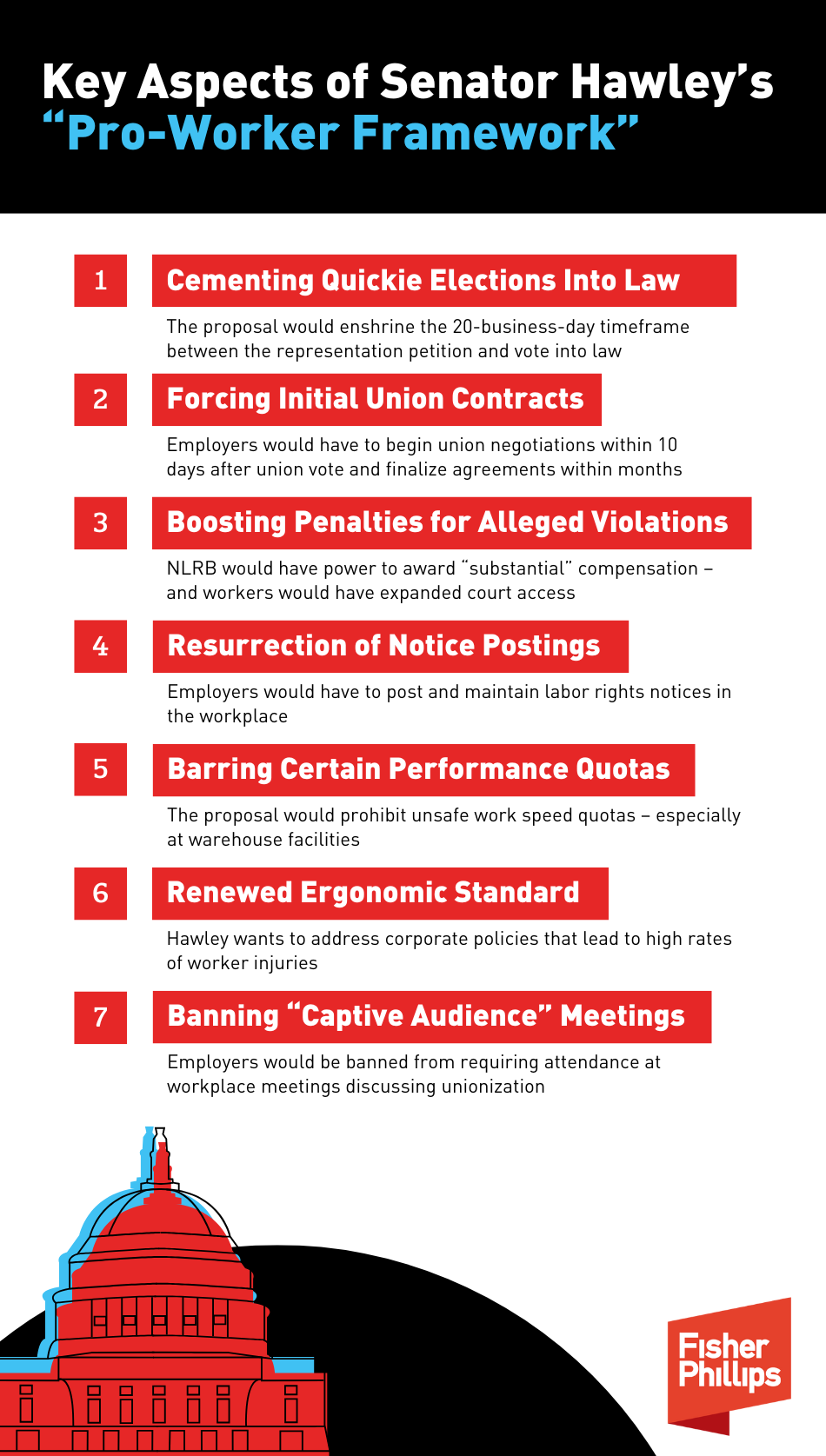Republican Senator Surprises Employers By Releasing Framework for Pro-Labor Bill: 7 Key Sections to Track
Insights
1.13.25
Just days into the newest Congressional session, a key Republican Senator shocked many employers by pushing for a law that would significantly tilt the playing field to the benefit of unions and labor advocates. Senator Josh Hawley’s (R-MO) “Pro-Worker Framework,” revealed on January 10, calls for pro-labor changes historically advocated for by Democrats and mirrors many aspects of the proposed PRO Act that has been long championed by labor leaders. Is this the beginning of a true labor revolution that will upend the traditional status quo, a plan destined to go nowhere, or something in between? Here are the seven key sections of the proposal and our thoughts about what to expect in the coming months.

Quick Background
We’ve seen many signs that the incoming administration and certain Republican lawmakers will take a more populist and worker-friendly approach than has been associated with conservative policymakers in the past. Not only did the President-elect nominate a self-avowed labor advocate to helm the Department of Labor, but he courted unions and union workers throughout his campaign. Meanwhile, the Teamsters’ President Sean O’Brien – who spoke at the Republican National Convention – revealed last summer that he would like to work with Senator Hawley on a mini-PRO Act proposal in the new year. Those rumblings seem to be coming to fruition with Friday’s release.
7 Initiatives Contained in Hawley’s Proposal
Senator Hawley said his proposal would “strengthen protections for organizing and collective bargaining – empowering workers to know their labor rights, avoid coercive management tactics, hold union elections, and negotiate their contracts fairly.” So what exactly would his proposal entail if passed?
1. Cementing Quickie Elections Into Law
Senator Hawley’s proposal says it would prevent corporate delay tactics during union organizing drives by requiring a union election vote “in less than 20 business days” – assumedly 20 business days after the filing of a representation petition. This would mean that the accelerated “quickie” election timeframe – in place since 2023 but potentially on the chopping block with a Republican-controlled Labor Board about to come into power – would be cemented in law. No longer would this standard be subject to the typical flip-flopping that comes along with changes in presidential administrations.
2. Forcing Initial Union Contracts
After workers win a vote to join a union, the initial collective bargaining process can take a good deal of time as union representatives and employers work to craft terms that are acceptable to both sides. Labor advocates have long lamented this process and have often tried to rush the negotiations along, pushing for draconian consequences to employers if they don’t agree to contracts according to a certain timetable. Senator Hawley’s proposal would require the employer to begin negotiating with the union within 10 days after workers have voted to join a union and to execute these agreements “within months.” How this deadline would be enforced remains to be seen, but unions have pushed for many years for interest arbitration – where an arbitrator decides among competing proposals – in initial contracts.
3. Boosting Penalties for Alleged Violations
Currently, employers can face significant consequences if found to have violated the National Labor Relations Act (NLRA). The Board has the power to impose cease and desist orders, require reinstatement and backpay to affected workers, order employers to the bargaining table, and force employers to pay reimbursement expenses to unions – and also foreseeable consequential damages to workers. But many labor advocates want to take this much further. Senator Hawley’s proposal caters to these desires by creating a system for “real penalties,” including the possibility of “substantial compensation” and the ability for workers and unions to seek redress in court if the Board fails to bring suit.
4. Resurrection of Notice Postings
The proposal calls for the return of a controversial requirement forcing employers to post and maintain notices of labor rights in the workplace. It would also require employers to affirmatively notify new employees of these rights when they’re hired. The NLRB previously enacted such a rule – but a court struck it down in 2014, and it hasn’t seen the light of day since.
5. Barring Certain Performance Quotas
While short on specifics, the proposed framework would prohibit unsafe work speed quotas – especially at warehouse facilities. It sounds similar to the controversial Warehouse Workers Protection Act, which you can read about here.
6. Renewed Ergonomic Standard
Workplace veterans may remember the Clinton-era OSHA Ergonomic Standard. It aimed to reduce workplace musculoskeletal disorders (MSDs) by requiring employers to implement ergonomics programs – but the complexity, cost implications, and potential conflicts with state workers’ compensation laws led to opposition from employers and business groups. After just two months, Congress used the Congressional Review Act to disapprove it in March 2001, and President Bush killed the rule by signing the resolution into law. While we don’t know the extent to which Senator Hawley’s proposal wants to resurrect the entire standard, he did indicate he wants to address “other corporate policies that lead to high rates of worker injuries” – which sounds familiar.
7. Banning “Captive Audience” Meetings
For more than 75 years, employers have been free to convey their views on unionization to employees – including requiring attendance at meetings to discuss these issues as long as no direct threats or promises are made. But the National Labor Relations Board (NLRB) dispensed with that precedent in a November decision that bans these so-called “captive audience” meetings. Now it appears that Senator Hawley wants to enshrine some version of this standard into federal law. He did say that his proposal would “protect free speech rights of business owners,” so we’ll wait to see the details to determine the extent of it.
What’s Next?
Last week’s release is just the start of a complicated dance that will take months – if not years – to play out. You should reserve judgment about the extent of these proposals until we see the finalized legislative text, as the devil is always in the details.
We expect sides to quickly start weighing in on Senator Hawley’s proposal, with labor advocates hailing the framework and business groups pointing out all of its flaws. We’ll also monitor things on the other side of the aisle to see how Democrats respond. Some may contend that it doesn’t go far enough, but we could see some moderate Democratic lawmakers get behind the proposal.
The rubber will meet the road, however, when other Republican lawmakers and President-elect Trump react to the proposal. If we begin to see a groundswell of support from these groups, we would not be surprised if this mini-PRO Act gains some traction.
What Should You Do?
It’s dangerous to put too much stock into any legislative proposal so early on in the process, but this plan is such a potential game-changer that it’s worth observing closely. We will continue to monitor this and related issues and provide updates when necessary, so make sure you are subscribed to Fisher Phillips’ Insight System to receive the most up-to-date information directly in your inbox.
If you want to play a role in shaping workplace policy such as this proposal, contact FP Advocacy to learn how you can get involved. Never before has it been so important for employers to make their voices heard in Washington, D.C.
If you have any questions, contact your Fisher Phillips attorney, the authors of this Insight, or any member of our Labor Relations Group, Workplace Safety Group, or Government Relations Group.
Related People
-
- Benjamin M. Ebbink
- Partner
-
- Rick Grimaldi
- Partner
-
- Todd B. Logsdon
- Partner
-
- Todd A. Lyon
- Partner and Labor Relations Group Co-Chair
-
- Joshua D. Nadreau
- Regional Managing Partner and Vice Chair, Labor Relations Group




